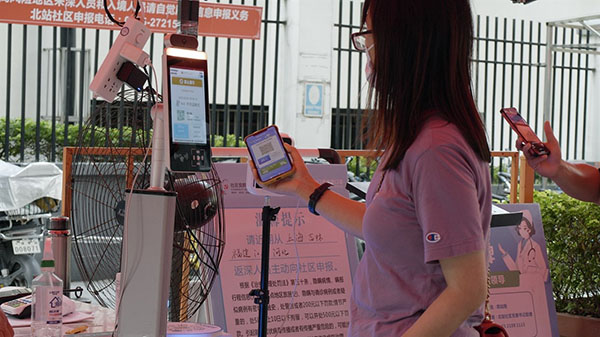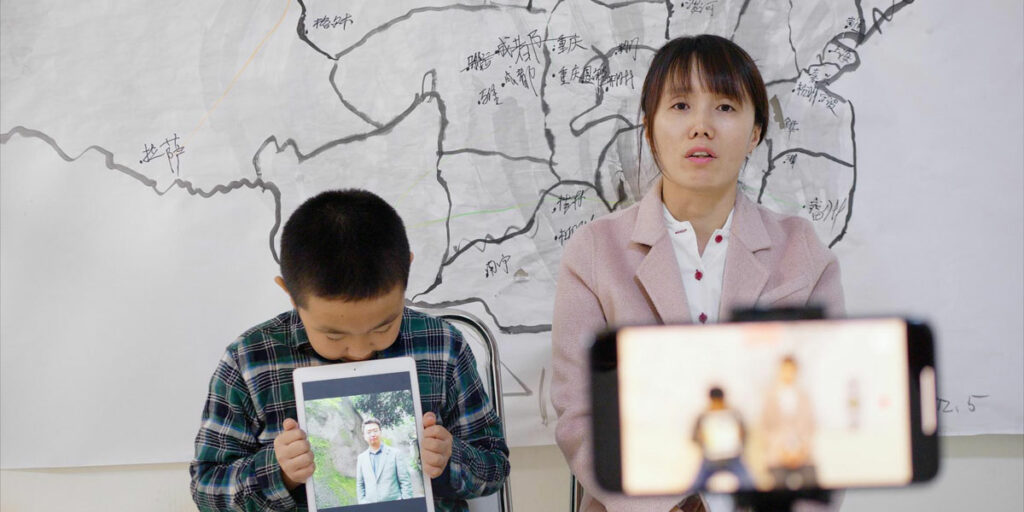In Total Trust, the camera becomes a tool of both oppression and resistance for three activists fighting China’s authoritarian regime.
Invocations of George Orwell’s 1984 are so common in Anglo-American political discourse that they have all but lost their meaning. Whether it’s about fake news, Covid-19 lockdowns or the supposed scourge of ‘wokeism’, commentators across the ideological spectrum jump at the chance to drop ‘Orwellian’, ‘Big Brother’ and ‘newspeak’ into any given debate. Total Trust, Zhang Jialing’s haunting study of a true surveillance state, is a sober reminder that such terms should not be used lightly.
Stitching together footage from a range of sources and formats, Total Trust lays bare the horrifying extent of technology-driven social control in contemporary China. It was directed remotely by the effectively exiled Zhang, with the footage smuggled out by her extraordinarily courageous crew. Beginning with a depiction of the Chinese Communist Party’s lavish centenary celebrations, the film focuses primarily on three stories of activists and their families under intense oppression as a result of the state’s ‘social management’ programme. As they try to navigate this dystopia of ‘social credits’, location tracking and AI facial recognition, the families of two defence lawyers and the journalist trying to tell their stories risk everything to offer us this movingly candid testimony.
From Un Chien Andalou (1929) to 2001: A Space Odyssey (1968), right up to Céline Sciamma’s female gaze, cinema has always been obsessed with the nature of seeing and being seen. This has been explored beyond the realm of fiction, too: Joshua Oppenheimer’s The Look of Silence (2014) and the documentaries of Agnès Varda come to mind. Total Trust continues in this vein, and is most memorable for the cameras, screens and lenses that fill up almost every frame of its 97 minutes.

When we aren’t looking at cameras, we are looking through them, engaging ourselves in the voyeurism that characterises the lives of the film’s subjects. The flattening effect of the deep focus in both the surveillance footage and Zhang’s sweeping landscape shots make the world’s most populous country seem so very uncomfortably small. In fact, such is the effectiveness of Zhang’s paranoia-inducing directorial style that we start to see cameras and screens in everything: the giant circular shape of an abstract public sculpture, or the lit-up rectangles of apartment living rooms, for example.
Visual culture permeates the lives of the subjects of Total Trust. They are seen recording public appeals on camcorders, attending international conferences via video link and flicking through old photos and videos to remember those they can no longer see in the flesh. The wife of an imprisoned lawyer even has life-size cardboard cut-outs made for her young son, who can barely remember his father, to kiss and embrace. In these tender scenes, seeing is believing, and the act of viewing is reclaimed as an instrument of remembrance and resistance.
But so rarely is the camera their friend. A scene depicting the filming of a Japanese documentary on the same subject adds a metatextual element that leads us to consider the role of filmmakers, not to mention ours as spectators. When one of the subjects is reminded of the disproportionate consequences of appearing in this doc within a doc, the camera, even in the hands of an ally, is once again shown to be a tool of the oppressor.
With an unflinching viewpoint backed by a foreboding synth-driven score, there’s no getting around the fact that Total Trust makes for difficult viewing. Those looking for hope amid the darkness will cling onto the brief moments of levity, normally provided by the innocent children caught up in all this, but they are few and far between. This powerful documentary presents a bleak portrait of an Orwellian state in the truest sense, posing some interesting questions around visual culture and the nature of documentary to boot. You won’t be able to look at the cold, uncaring circle of a camera’s eye the same way again.
Total Trust had its UK premiere at the Sheffield DocFest on June 15-18, 2023 and will be released in US theaters on December 8.

